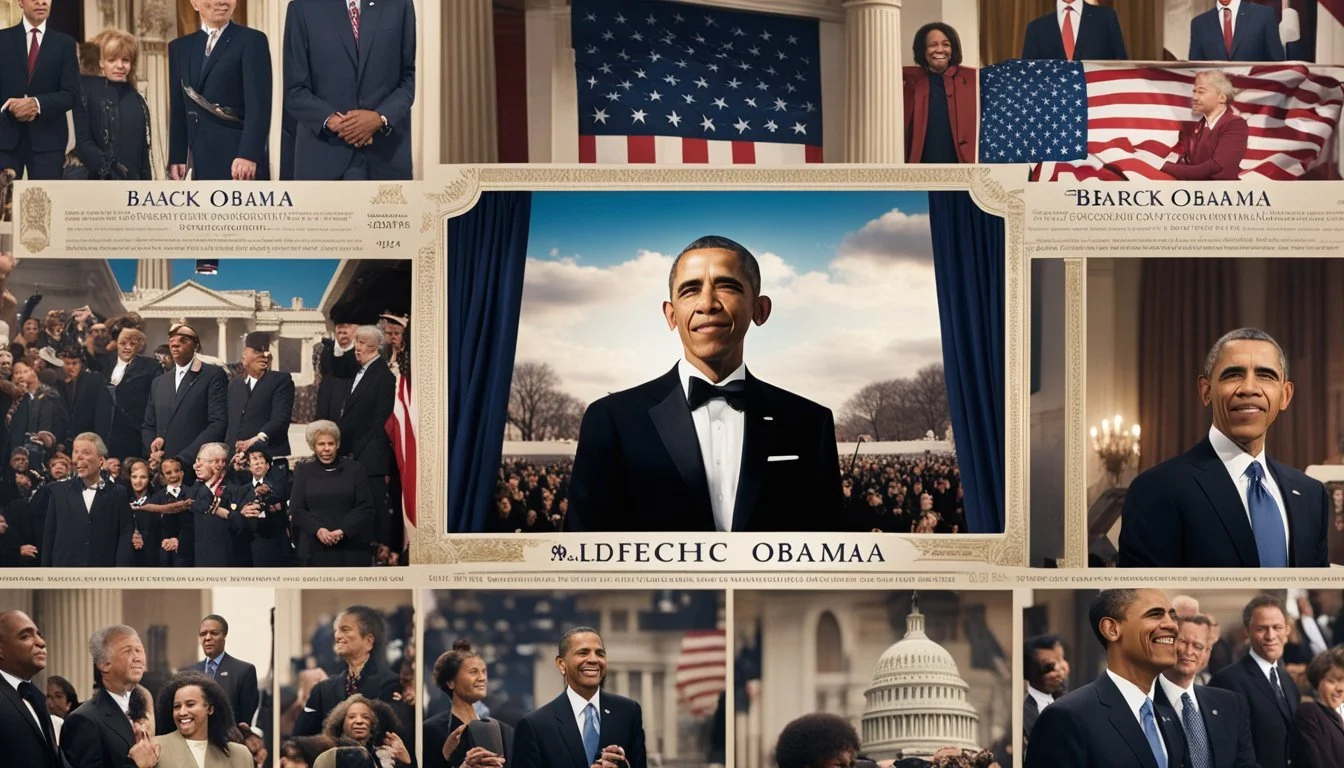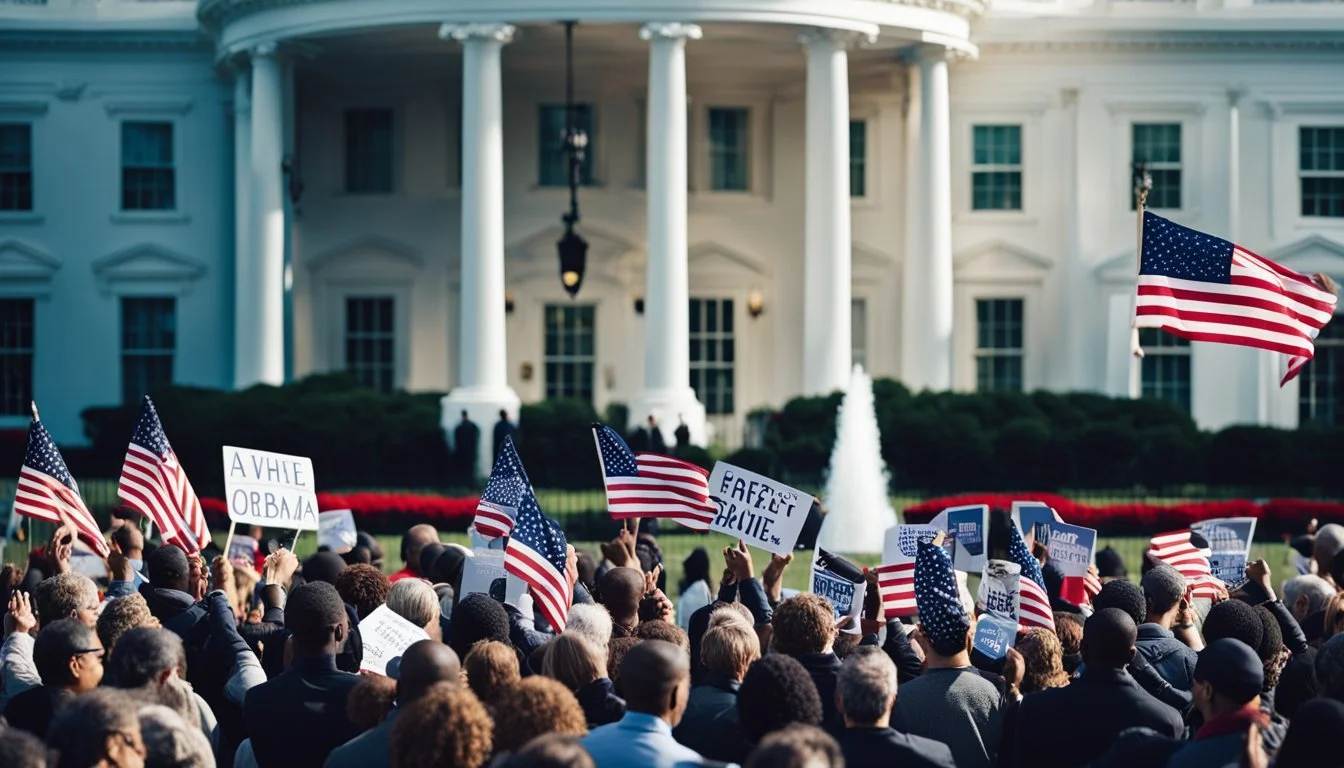11 Films Exploring the Presidency of Barack Obama
A Cinematic Journey
The presidency of Barack Obama, marked by significant political and social changes, has been the subject of extensive cinematic exploration. These films offer invaluable insights into Obama's policies, leadership, and the broader implications of his two-term tenure. Through these visual narratives, audiences can gain a deeper appreciation for the complexities and challenges faced by the 44th President of the United States.
Cinematic portrayals of Obama's presidency not only highlight his achievements and controversies but also delve into his personal and political journey. From documentaries to biopics, these films provide a multifaceted view of Obama's impact on American society and politics.
1) Obama: Path to the White House (2013)
"Obama: Path to the White House" is a documentary that delves into the journey of Barack Obama from his early years to his rise as the 44th President of the United States.
The film covers critical moments in his journey, including his time as a community organizer in Chicago, his tenure as a state senator, and his notable speech at the 2004 Democratic National Convention.
The documentary explores Obama's challenges and successes during his Senate career, shedding light on his legislative efforts and his decision to run for the presidency.
The film also highlights the historic nature of his campaign and how he managed to build a broad coalition that ultimately secured his victory in the 2008 election.
For more details on the documentary, visit Wikipedia.
2) The Obama Years: The Power of Words (2017)
"The Obama Years: The Power of Words" examines the exceptional oratory skills of Barack Obama. The film highlights how Obama’s speeches have resonated with a wide audience, emphasizing themes of patriotism, unity, and hope.
One of the notable aspects of this documentary is its focus on six key speeches that define Obama’s legacy. These speeches showcase his ability to address complex issues and inspire change through eloquent and powerful language.
The documentary features insights from prominent historians like Doris Kearns Goodwin. Her commentary provides context on how Obama's speeches compare to those of past presidents and underscores the challenges he faced in rallying support for his legislative agenda.
Obama’s rise to national prominence at the 2004 Democratic National Convention is a key moment explored in the film. This speech catapulted him into the national spotlight and set the stage for his future political success.
The documentary also addresses how the effectiveness of the “Bully Pulpit” has evolved over time. Obama's struggles with getting congressional support for new gun laws illustrate the limitations that modern presidents face.
For more details about the film, visit IMDb.
3) Southside With You (2016)
"Southside With You" is a biographical romantic drama film directed and written by Richard Tanne.
The story centers on a summer afternoon in 1989, detailing the first date between future President Barack Obama and future First Lady Michelle Obama.
Parker Sawyers stars as a young Barack Obama, while Tika Sumpter portrays Michelle Robinson.
The film captures their day-long date across Chicago's South Side, highlighting their encounters, conversations, and growing connection.
Rather than focusing on political achievements, the film takes a more personal approach, exploring the early relationship dynamics between the couple.
This perspective offers viewers a glimpse into the personal lives of two prominent public figures at a stage before their rise to international prominence.
For more details, see Southside With You on IMDb.
4) The Final Year (2017)
The Final Year is a 2017 documentary directed by Greg Barker. It provides an in-depth look at the final year of Barack Obama's presidency through the lens of his foreign policy team.
The documentary follows prominent figures such as Ben Rhodes, Samantha Power, John Kerry, and Susan Rice.
Their efforts to manage global diplomacy and maintain U.S. international relations are highlighted.
Scenes feature various high-stakes meetings and diplomatic missions. The film captures the challenges and urgency faced by Obama’s team in their final months in office.
Significant global events during this period are covered, offering a candid view of the exhaustive work behind American diplomacy.
For more details on The Final Year, visit IMDb here.
5) Barack Obama: His Story
"Barack Obama: His Story" (2008) offers an in-depth look at Obama's journey from his early life to his rise in politics. The film covers his childhood in Hawaii and Indonesia, shedding light on his multicultural background.
The documentary uses interviews with family, friends, and colleagues to provide insights into his personality and values. This narrative helps explain how his diverse experiences shaped his worldview.
Obama's time as a community organizer in Chicago is a focal point. The film showcases his work in improving local neighborhoods, emphasizing his commitment to public service. This stage of his life is crucial in understanding his entry into politics.
His tenure as a state senator and his landmark speech at the 2004 Democratic National Convention are highlighted. These moments are portrayed as pivotal in propelling him to national attention.
Finally, the film explores his 2008 presidential campaign, capturing the historic nature of his election win. It reflects on the themes of hope and change that defined his campaign and resonated with voters.
For more details on this film, visit IMDb.
6) Becoming Barack (2009)
"Becoming Barack" provides an insightful look into the early years of Barack Obama in Chicago. Directed by Robert Yuhas, the film features the oldest videotape interview of Obama, conducted in 1993.
The documentary focuses on his development, decisions, and experiences that shaped his political career. It includes interviews with friends, colleagues, and mentors who played a significant role during his formative years.
Special attention is given to his time as a community organizer. This period highlights his commitment to social justice and the lessons he learned while working in the neighborhoods of Chicago.
The film portrays Obama’s journey to a sense of self and purpose. It explores the complex worlds of race, class, and identity that he navigated to become the leader he is known as today.
This documentary stands out for its personal anecdotes and historical context. It provides viewers with a deeper appreciation of the experiences that molded Barack Obama’s early life and political ethos.
For more information, visit IMDB.
7) 2016: Obama's America (2012)
2016: Obama's America is a political documentary directed by Dinesh D'Souza. Released in 2012, the film is based on D'Souza’s book, The Roots of Obama's Rage.
The documentary presents a critical analysis of President Barack Obama's policies and projections of America’s condition if Obama won a second term. It combines interviews and reenactments to make its points.
D'Souza explores Obama's upbringing and influences, suggesting that his father's anti-colonial beliefs shaped his political outlook.
The film attracted significant attention during the 2012 presidential election. It invokes strong opinions, reflecting the polarizing nature of Obama's presidency.
More details can be found here: 2016: Obama's America on Wikipedia.
8) The Road We’ve Traveled (2012)
"The Road We’ve Traveled" is a 17-minute documentary directed by Davis Guggenheim. Released in 2012, it focuses on the major events and decisions of Barack Obama’s presidency up to that point.
The film was produced by Obama’s re-election campaign. Tom Hanks narrates the documentary, adding a familiar and respected voice to the portrayal of Obama's first term.
Featuring key moments such as economic measures and healthcare reform, the documentary aims to highlight the challenges and accomplishments during Obama's time in office.
The film received attention for its production quality and narrative, reflecting Obama's journey and the broader impact of his presidency. For more information, visit Wikipedia.
9) By The People: The Election of Barack Obama (2009)
"By The People: The Election of Barack Obama" is a documentary film that chronicles Barack Obama's journey to the presidency.
Directed by Amy Rice and Alicia Sams, the film provides an inside look at Obama's presidential campaign. Cameras began rolling nearly a year before Obama announced his candidacy.
The film captures the daily events of the campaign over 19 months, offering viewers unprecedented access to the candidate and his team.
Produced by Edward Norton, the documentary aired on HBO in November 2009. It features key campaign staff like Neil Abercrombie, Dick Armey, and David Axelrod.
The documentary not only highlights Obama's public appearances but also reveals behind-the-scenes moments.
The film illustrates the dedication and effort of Obama's campaign team as they navigate the complexities of a presidential race.
For further information, you can visit the Wikipedia page or the IMDB page.
10) All the President’s Films
This section explores films and documentaries that delve into Barack Obama's presidency, shedding light on his journey, accomplishments, and challenges.
Leave the World Behind (2023)
Barack Obama contributed to this movie by providing key notes on the script and characters, utilizing his presidential experience. More Info
America’s Journey: The Inauguration of Barack Obama (2009)
Witness the historic moment as Obama is inaugurated as the 44th President of the United States. More Info
Revealed: The Hunt for Bin Laden (2012)
This documentary focuses on the mission to capture Osama bin Laden, a significant event during Obama’s tenure. More Info
Obama: Building the Dream (2013)
A film that examines Obama's early life, political career, and path to the presidency. More Info
The Final Year (2017)
An immersive look at Obama’s administration during its last year, providing insights into his foreign policy team. More Info
Becoming (2020)
This documentary follows Michelle Obama on her book tour, offering glimpses into her and Barack's life post-presidency. More Info
The Way I See It (2020)
Focusing on Pete Souza, the White House photographer, it contrasts the Obama and Trump presidencies through Souza’s lens. More Info
Higher Ground (2019)
Produced by the Obamas' Higher Ground Productions, this documentary highlights American communities and their challenges. More Info
American Factory (2019)
Another production by Higher Ground, it examines the clash of cultures when a Chinese billionaire reopens a factory in Ohio. More Info
The Obama Years: The Power of Words (2017)
This film explores the impact of Obama's speeches over his eight years in office. More Info
11) The Obama Legacy
The Obama Legacy (2024) explores the significant impact and comprehensive legacy of Barack Obama's presidency. Directed by Phil Bertelsen, this documentary captures the journey and major events that defined Obama's two terms as the 44th President of the United States.
The film delves into Obama's groundbreaking election as the first African-American president and the challenges he faced in office. Key moments from his terms, such as the passage of the Affordable Care Act, are highlighted to provide viewers with a detailed timeline of his presidency.
Through interviews with politicians, historians, and social commentators, the documentary offers a balanced view of Obama's achievements and the criticisms he faced. The emphasis is on how his policies and leadership have shaped contemporary American society.
The visuals and narrative make this film an insightful resource for those interested in understanding the nuances of Obama’s political journey and its lasting effects on the nation.
The Impact of Obama’s Presidency on American Society
Barack Obama’s tenure as President brought significant changes to various aspects of American society. Key areas impacted include healthcare, economic policies, and civil rights advancements.
Healthcare Reforms and the Affordable Care Act
The Affordable Care Act (ACA), signed into law in 2010, aimed to make healthcare accessible to more Americans. It introduced health insurance marketplaces, expanded Medicaid eligibility, and mandated that insurance providers extend coverage for pre-existing conditions.
Additionally, the ACA allowed young adults to remain on their parents' insurance until age 26, significantly reducing the uninsured rate. These reforms faced considerable political opposition but led to millions of previously uninsured Americans gaining health coverage.
Economic Policies and Recovery Efforts
Obama inherited an economy in crisis due to the 2008 financial meltdown. His administration responded with the American Recovery and Reinvestment Act of 2009, which invested in infrastructure, education, and renewable energy.
This act aimed to create jobs and stimulate economic growth. The administration also implemented financial reforms through the Dodd-Frank Act to prevent future economic collapses. By the end of his presidency, the unemployment rate had dropped significantly, and the economy showed notable improvement.
Advancements in Civil Rights
Obama's presidency heralded substantial progress in civil rights. His support for LGBTQ+ rights led to the repeal of "Don't Ask, Don't Tell" in 2010, allowing LGBTQ+ individuals to serve openly in the military.
He also endorsed the legalization of same-sex marriage, culminating in the 2015 Supreme Court ruling that made it legal nationwide. On matters of racial equality, Obama addressed police violence and systemic racism, although these issues remain deeply embedded in American society.
Obama's legacy in civil rights includes increased visibility and legal protections for marginalized communities, even though challenges persist.
Obama’s Leadership Style and Decision-Making
Barack Obama’s leadership was marked by effective communication skills and a nuanced approach to complex issues. He emphasized diplomacy in foreign matters and took significant steps towards addressing environmental concerns.
Diplomatic Relations and Foreign Policy
Obama's diplomatic approach aimed at rebuilding relationships with key international allies. His administration initiated dialogue with countries long isolated by the U.S., such as Cuba and Iran.
The Obama administration's negotiation of the Iran Nuclear Deal exemplified his preference for diplomatic solutions. This agreement was designed to halt Iran’s nuclear weapons program in exchange for lifting economic sanctions.
Additionally, Obama's strategy involved troop drawdowns from conflict regions, focusing on multilateral efforts to address global challenges. His leadership reinforced the importance of international collaboration and strategic alliances.
Environmental and Climate Change Initiatives
Obama took a proactive stance on environmental issues, advocating for substantial policy changes to combat climate change. Under his leadership, the U.S. became a participant in the Paris Agreement, committing to significant reductions in greenhouse gas emissions.
He implemented the Clean Power Plan, aimed at reducing carbon pollution from power plants. This plan represented a key component of his strategy to transition to clean energy.
Obama's policies also included investments in renewable energy sources like solar and wind, bolstering their role in the national energy mix. His leadership underscored the urgency of addressing climate change, prioritizing sustainable development and environmental stewardship.
Legacy and Influence of Barack Obama
Barack Obama's presidency had a profound impact on both public opinion and culture, shaping views on leadership and inspiring many across different spheres of society. His tenure is marked by high approval ratings and significant cultural contributions.
Public Opinion and Approval Ratings
During his presidency, Barack Obama maintained relatively high approval ratings. At different points, his popularity fluctuated but often remained above 50% in various polls. Notably, his handling of the economic crisis and the implementation of the Affordable Care Act were key issues that influenced public opinion.
Obama's approval ratings were also buoyed by his responses to social issues and foreign policy. His administration supported marriage equality and took significant steps towards climate change mitigation. Public opinions on achievements like the assassination of Osama bin Laden further reinforced his leadership image.
Cultural and Inspirational Impact
Barack Obama's cultural impact extended beyond traditional politics. As the first African American president, he became a symbol of progress and inclusivity. His speeches and public demeanor inspired a new generation of leaders and activists.
Obama's presence in media, including documentaries and books, contributed to a wider cultural discourse. His administration saw increased discussions around race, equity, and social justice. Furthermore, his personal story—from a community organizer to the Oval Office—served as an inspirational narrative for many, encouraging them to engage in civic and political life.
In media and literature, Obama's legacy continues to be a subject of exploration and admiration, reflecting his enduring influence.




